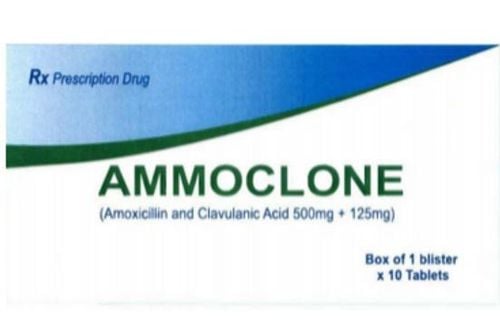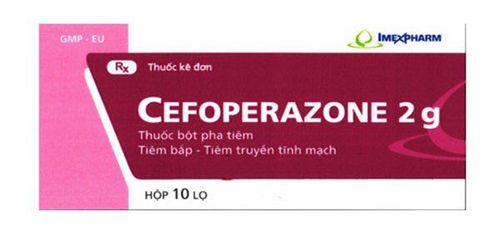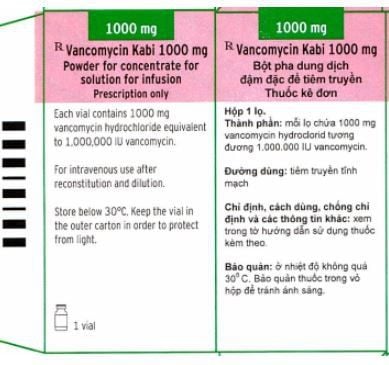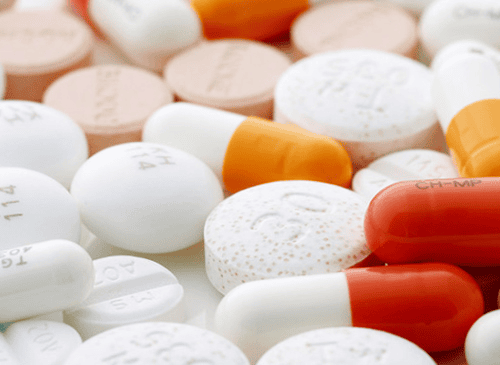This is an automatically translated article.
Bestacefdine belongs to the group of antiparasitic, anti-infective, anti-viral, anti-fungal drugs. The drug is indicated for the treatment of infections of various etiologies. Let's find out what the drug Bestacefdine has and some notes when using it in the following article.1. What is Bestacefdine?
Bestacefdine contains the main ingredient Cefradine 1g and other excipients provided by the manufacturer. The dosage form of the drug is powder for injection, the packaging is box form of 10 vials.
Active ingredient Cefradin is a medium-spectrum antibiotic, active against gram-positive bacteria such as staphylococcus, streptococcus, pneumococcus (except Methicillin-resistant streptococcus). The drug is also active against some gram-negative bacteria such as E.coli, Klebsiella pneumoniae, Proteus mirabilis and Shigella. Resistant strains such as Enterococcus, Methicillin-resistant Staphylococcus, Proteus with positive indole reaction, Enterobacter, Pseudomonas aeruginosa, Bacteroides.
2. What are the effects of Bestacefdine?
Bestacefdine is indicated for the treatment of the following cases:
Skin and skin structure infections such as boils, impetigo, inflammation around the skin. Respiratory tract infections such as tonsillitis, pharyngitis, lobar pneumonia, bronchitis. Uncomplicated urinary tract infections such as cystitis. Severe urinary tract infections (including prostatitis). Influenzae otitis media. Bone infection, sepsis. In addition, Bestacefdine is contraindicated in the following cases:
Patients are allergic to the active ingredient Cefradin or other excipients contained in the drug.
3. Dosage and how to use the drug Bestacefdine
The dosage form of the drug is powder for injection, so the patient takes the drug by intravenous or intramuscular injection.
The following is the recommended dose of Bestacefdine:
Adults:
Skin and skin structure infections, respiratory tract infections (except lobar pneumonia), uncomplicated urinary tract infections: 500mg x 2 times/day. Severe urinary tract infections (including prostatitis) and lobar pneumonia: 500mg x 4 times/day or 1g x 2 times/day. Bone infections: Use at a dose of 1g x 4 times/day. Sepsis: Take a total dose of 8g per day. Children:
Use at a dose of 50-100mg/kg/day, divided into 4 times per day. For patients with renal impairment: Adjust dose based on creatinine clearance.
Note: Above is the manufacturer's reference dosage. Depending on your health condition and different pathology, the doctor will base on that to prescribe the appropriate one. Therefore, patients should only use the drug when prescribed by a doctor and instructed to use it properly.
4. Side effects of the drug Bestacefdine
Doctors always consider between the benefits that Bestacefdine brings to the patient and the possible risk of side effects to prescribe the appropriate medication.
Bestacefdine is well tolerated, these undesirable effects usually appear during the initial period of mild or moderate use.
Some common side effects when taking Bestacefdine include:
Gastrointestinal disturbances, nausea, Lyell's syndrome, pseudomembranous colitis, epigastric pain, glossitis. Increased liver enzymes, altered kidney function, pneumonia, PIERRE syndrome, superinfection, vitamin K and B deficiency. Headache, dizziness, fatigue, hallucinations, asthenia. Rash, urticaria, erythema, pruritus, fever, lymphadenopathy, edema, arthralgia. Note: In addition to the side effects listed above, Bestacefdine medicine may cause other unwanted symptoms that are not known. Therefore, at any time when a patient takes a drug, there are suspected related side effects, they should immediately notify the doctor or pharmacist for clear advice and intervention when necessary.
5. Bestacefdine drug interactions
During the use of Bestacefdine, there may be interactions when combined with other drugs or food that have not been clearly identified. In order to limit the occurrence of harmful interactions for the patient, before being prescribed by the doctor, the patient should inform the patient about the drugs they are taking, including prescription or non-prescription drugs, dietary supplements, and herbal medicines. ,...
6. Notes when taking the drug Bestacefdine
Some notes when patients use Bestacefdine medicine as follows:
Use caution when using the drug for patients with a history of allergy to penicillin, severe kidney failure or a history of allergies such as asthma, rash and urticaria. Patients should take the drug according to the doctor's prescription, should not increase or decrease the dose of the drug. Follow the doctor's treatment time to avoid taking the wrong drug with the risk of drug resistance. Should not stop taking the drug suddenly when the clinical symptoms have improved... Absolutely do not give the drug Bestacefdine to other people to drink if the disease condition has similar symptoms. Patients should check the expiration date on the package before taking the medicine, if the drug has expired, it should not be used. Each drug has a different shelf life recommended by the manufacturer, when the drug has expired, the active ingredients will be changed, causing harmful effects to the patient. Pregnancy: Bestacefdine can cross the placental barrier, although the potential risk to the fetus has not been clearly established. In case it is necessary to use the drug, it is advisable to consult a doctor to avoid consequences that may affect the fetus such as miscarriage, malformation, ... For children whose mothers during pregnancy use Using Bestacefdine, after giving birth, it is necessary to closely monitor for signs of adrenal insufficiency. Lactation: According to clinical studies, the drug Bestacefdine is excreted in breast milk, affecting the baby during breastfeeding. In case a nursing patient must take Bestacefdine, breast-feeding should be discontinued before starting treatment. 7. What to do in case of missed dose or overdose of Bestacefdine? When the patient forgets to take a medicine, take the dose as soon as he remembers. Usually drugs that can be taken 1-2 hours after the daily dose do not affect the treatment. Absolutely avoid making up for a double dose when you forget to take the medicine. The missed dose may be skipped when it is almost time for the next scheduled dose. If you accidentally overdose, the patient should stop taking the drug immediately, self-monitor for changes in the body if there are any symptoms that are suspected to be related to the drug overdose. Immediately notify your doctor or pharmacist for advice on appropriate treatment. When the symptoms become more severe, the patient should be taken to the hospital immediately for timely treatment to avoid serious complications. Patients should also remember to bring used medicines with them so that the doctor can understand the information and handle it quickly and promptly. Hopefully, the above article has provided all the relevant information about the uses, dosage and some notes when using Bestacefdine. Note, Bestacefdine is a prescription drug, patients can only use this drug when prescribed by a specialist.













